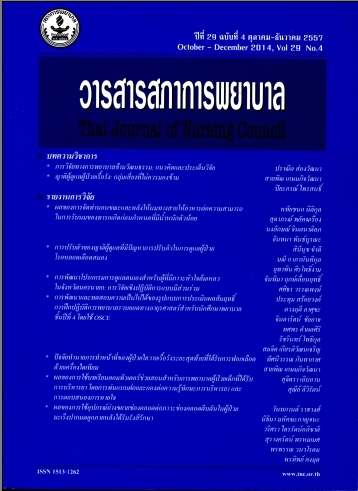ผลของการใช้อุปกรณ์ถ่างขยายช่องคลอดต่อภาวะช่องคลอดตีบตันในผู้ป่วยมะเร็งปากมดลูก ภายหลังได้รับการรักษาด้วยรังสีรักษา
Keywords:
อุปกรณ์ถ่างขยายช่องคลอด ภาวะช่องคลอดตีบตัน มะเร็งปากมดลูก รังสีรักษา, family caregiver, chronic patient, health problem risk groupAbstract
บทคัดย่อ
วัตถุประสงค์การวิจัย: เพื่อศึกษาผลของการใช้อุปกรณ์ถ่างขยายช่องคลอดต่อภาวะช่องคลอดตีบตันในผู้ป่วยมะเร็งปากมดลูกภายหลังได้รับการรักษาด้วยรังสีรักษา
การออกแบบการวิจัย: การวิจัยเชิงทดลอง
วิธีการดำเนินการวิจัย: กลุ่มตัวอย่างเป็นผู้ป่วยมะเร็งปากมดลูกที่สิ้นสุดการรักษาด้วยรังสีรักษา ใน โรงพยาบาลระดับตติยภูมิหนึ่งแห่งในกรุงเทพมหานคร กลุ่มตัวอย่างทั้งหมดจำนวน 50 คน แบ่งเป็น 2 กลุ่มกลุ่มละ 25 คน กลุ่มควบคุมได้รับการพยาบาลปกติโดยการขยายช่องคลอดด้วยนิ้วมือและกลุ่มทดลองได้รับอุปกรณ์ถ่างขยายช่องคลอด เมื่อสิ้นสุดการศึกษาเหลือกลุ่มตัวอย่างในกลุ่มควบคุมจำนวน 9 คนและกลุ่มทดลองจำนวน 24 คน การเก็บรวบรวมข้อมูลใช้แบบบันทึกข้อมูลส่วนบุคคลและแบบประเมินการขยายช่องคลอด วิเคราะห์ข้อมูลโดยใช้สถิติ Chi-square test for trend, สถิติ Fisher exact test, สถิติ t- test และสถิติการวิเคราะห์ความแปรปรวนร่วม (ANCOVA)
ผลการวิจัย: หลังการศึกษา กลุ่มทดลองมีอัตราส่วนความยาวช่องคลอดมากกว่ากลุ่มควบคุมอย่างมีนัยสำคัญทางสถิติ (p <.05) หมายถึง กลุ่มทดลองมีภาวะช่องคลอดตีบตันน้อยกว่ากลุ่มควบคุม
ข้อเสนอแนะ พยาบาลหน่วยรังสีรักษาควรนำอุปกรณ์ถ่างขยายช่องคลอดมาใช้กับผู้ป่วยมะเร็งปากมดลูกภายหลังได้รับการรักษาด้วยรังสีรักษาเพื่อลดหรือป้องกันภาวะช่องคลอดตีบตัน
Abstract
Objective:
Relatives taking care of chronic patients at home are prone to suffer from its negative physical, psycho-emotional and social effects, which could lead to chronic stress and deteriorating health. In particular, elderly and unwell family caregivers who are the patients’ spouses form a risk group that must not be overlooked. However, the present health-service system places primary emphasis on preparation of relatives to be family caregivers, but not on the caregivers’ state of wellbeing. This article, presenting an analysis of relevant research studies, attempts to describe (i) negative effects encountered by family caregivers, (ii) the need for holistic and comprehensive preparation of family caregivers to ensure that they receive uninterrupted attention and assistance from the time of the patients’ hospitalisation to the time of their discharge and return to their homes, and (iii) the continuity of caregiver-patient assistance coordination, in order to enhance the family caregivers’ efficiency in taking care of both the chronic patients and their own health, and improving the patients’ life quality in the process.








